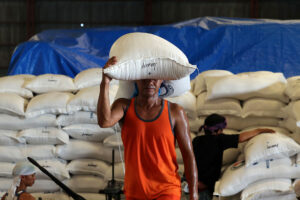THE private sector needs to be set rice import quotas tied to the level of their purchases of palay (unmilled rice) from domestic farmers, Agriculture Secretary Francisco P. Tiu Laurel, Jr. told Senators on Tuesday.
The quota is among the proposals put forward by the Department of Agriculture (DA) to amend the Rice Tariffication Law of 2019, Mr. Laurel said.
The law had allowed unrestricted imports by private traders who were made to pay an initial tariff of 35% on their shipments. Private imports were meant to replace imports brought in by the National Food Authority (NFA), whose import powers were stripped from it.
He added that private importers should share the NFA’s remaining function of maintaining the national rice reserve.
“I was thinking of 50-50,” he said, noting that if the buffer stock requirement is increased to 20 days from 15 currently, the government and the private sector should each maintain stock sufficient for 10 days’ demand.
The 50-50 scheme is expected to boost palay purchases and save the government storage costs, Mr. Laurel noted.
“If possible, we only import what we need plus the buffer stock,” he said, noting that only the private sector will remain solely responsible for imports.
Earlier amendments to the Rice Tariffication Law increased the minimum reserve requirement to 15 days’ demand from 9. Under the law, all rice held in reserve must be sourced from domestic farmers.
The DA is also seeking restoration of the National Food Authority’s regulatory duties and power to sell rice directly to the public.
Currently, the NFA is only allowed to sell rice to local government units (LGUs) and a limited number of other entities upon the declaration of a food security emergency.
Mr. Laurel noted that LGUs prefer imported rice over NFA stock due to the low price of imports.
He urged senators to back measures to modernize irrigation and logistics.
“To irrigate over a million hectares of farmland, we need more than P1 trillion. Without it, we enrich foreign farmers while our own continue to struggle,” he said, noting that “investment must match ambition if the Philippines is to achieve self-sufficiency and food security.”
He also expressed his opposition to the devolution of agricultural extension services under the Local Government Code.
Also on Wednesday, Senate Agriculture Committee Chairman Francis Pancratius N. Pangilinan sought to convene the Congressional Oversight Committee on Anti-Agricultural Economic Sabotage under Section 25 of Republic Act No. 12022 or the Anti-Agricultural Sabotage Act.
He said the government should start prosecuting rice traders under the law.
Mr. Pangilinan also urged the government to tap the nearly 25,000 graduates of agriculture courses from state universities and colleges, government schools, and other universities to fill the 2,500 vacancies at the DA. — Kyle Aristophere T. Atienza
